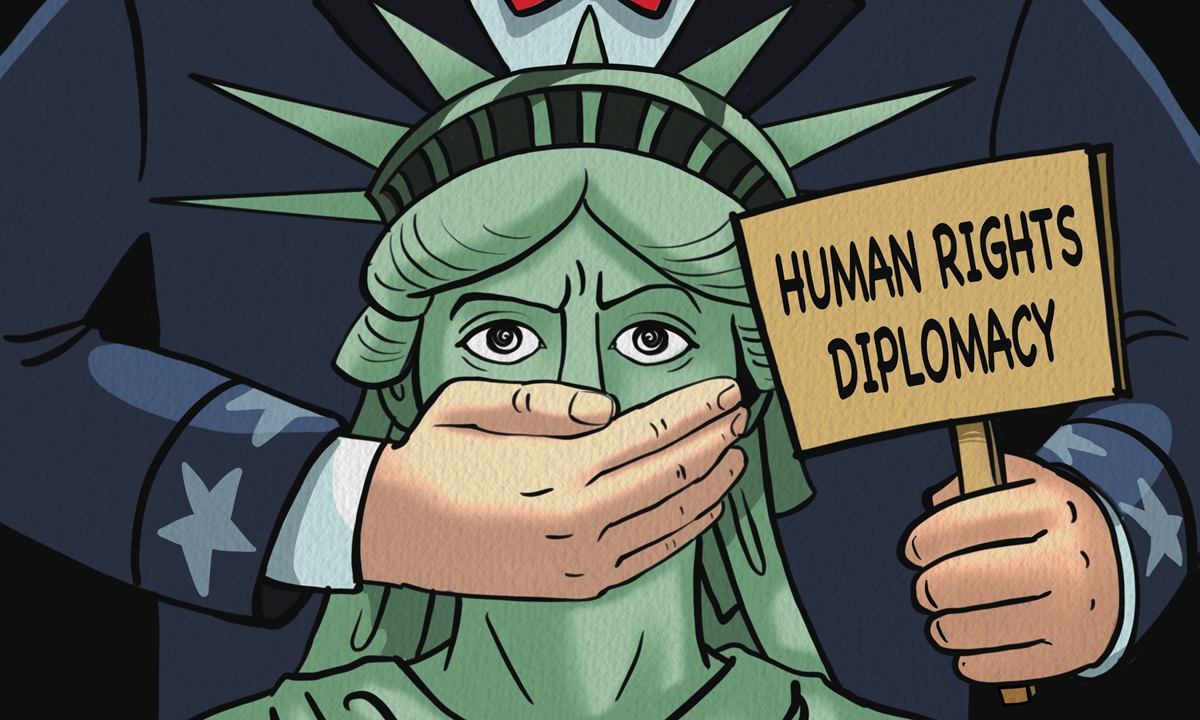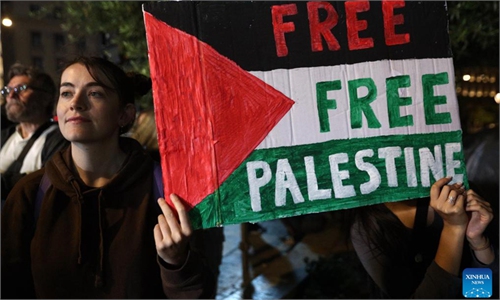
Illustration: Xia Qing/GT
The protests across US university campuses in recent weeks have been met with suppression. Six students at the University of Pennsylvania were arrested after attempting to occupy a hall on the university campus late Friday local time. On Wednesday, police cleared a student encampment at the University of California that had stood for more than two weeks, arresting 47 protesters.
Overall, the actions of the US Congress, the White House, and the mainstream media, which have continued to systematically suppress US college students' campus protests, continue to highlight the domestic dilemmas of US "human rights diplomacy."
Since the Jimmy Carter administration started championing "human rights diplomacy" in the late 1970s, the emphasis on "human rights" and "universal values" has always been key to US diplomacy.
US administrations have taken the moral high ground using slogans, such as "human rights diplomacy," "humanitarianism," "human rights over sovereignty," and "humanitarian intervention," especially after the end of the Cold War. Washington has acted as a "human rights preacher," "humanitarian policeman" and "practitioner of global human rights protection." It has also used "universal values on human rights" as a justification for unconditional hegemonic intervention on a global scale.
Pragmatically speaking, this round of college campus protests in the US is actually in line with the cognitive framework of "human rights diplomacy" and "humanitarian intervention" constructed by the US. Israel's military action in the Gaza Strip has clearly caused serious negative consequences far beyond humanitarian standards, proven by irrefutable evidence, including reports from the United Nations (UN) and the huge amount of videos that have appeared online. US university students, following the humanitarian concepts and human rights values they learned in class and heard about in the news, began to demand an end to their schools' financial ties to Israel and their country's support for Israel, while criticizing Israel's Gaza actions.
This, pragmatically speaking, is in line with not only the tradition of US campus life and the inculcation of the US education system, but also the perception of the US as a "defender of human rights," an image it has long shaped and defended.
If the Joe Biden administration can comply with the students' demands and take the necessary measures to respond positively and effectively, it will not only win support and votes for the Biden administration, but also score more moral points for the US international image. Moreover, it can create a stark contrast with Biden's election rival, Donald Trump.
But it is clear that the US government, along with the elites in the country, has used its own actions to teach a lesson to all individuals around the world who have illusions about US "human rights diplomacy," including those college students at home. The true meaning of "human rights diplomacy" is to use "human rights" and "humanitarianism" as a tool of US diplomacy, and the connotation of these two concepts is defined by neither US college students, the UN nor the victimized Palestinians. "Human rights diplomacy" can only be defined by the US elites who hold the highest power in Washington's decision-making circle.
This is very ironic. To some extent, it is tantamount to saying that only those forces can decide who is human and who is not. It is a disaster to see such blatant multiple standards, contradictory humanitarianism and "human rights diplomacy" defined by a handful of oligarchs and lobbies.
On the other hand, what the suppressed US college students need to ponder is how to save the US in the future from such a predicament. This may be something more important, for the US and the world, than just protesting.
The author is director of the Research Institution for Global Cyberspace Governance at Fudan University. opinion@globaltimes.com.cn


